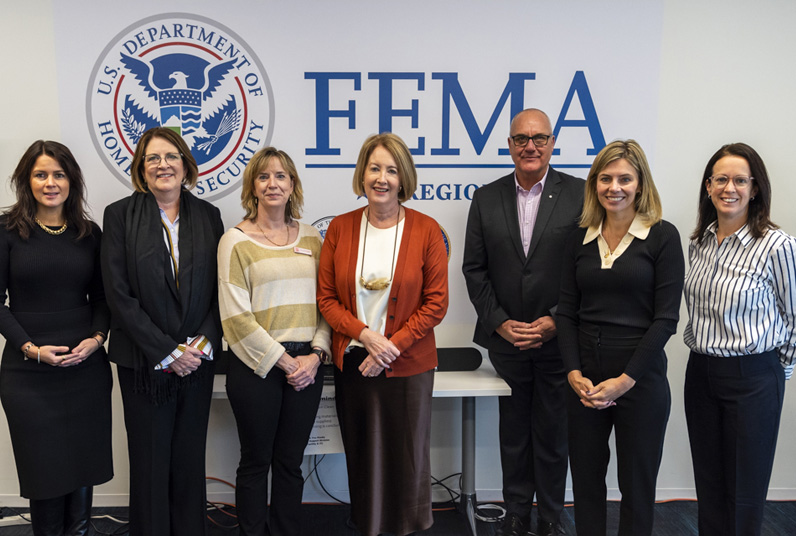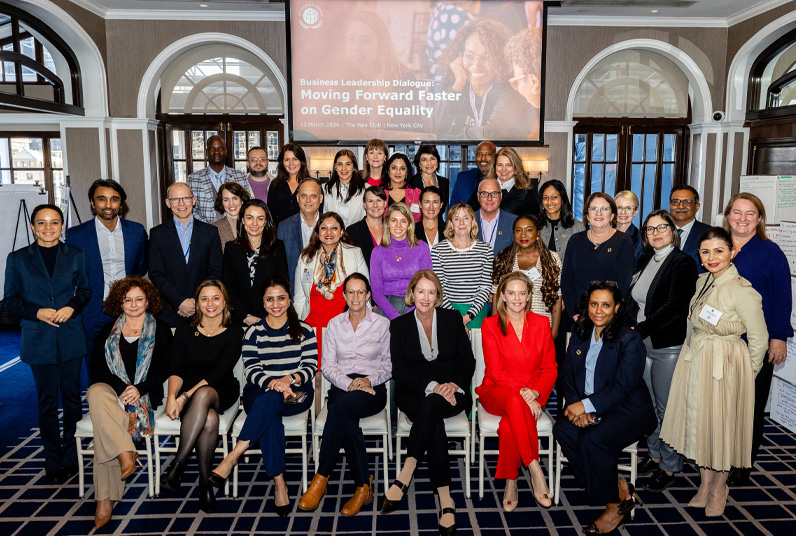In March 2024, an Australasian contingent of AFAC member representatives attended the United Nations 68th Session of the Commission on the Status of Women in New York. The group shared insights and formed new partnerships to accelerate women’s recognition and representation in the fire and emergency services sector.
Attendance was facilitated by the Champions of Change Coalition, which has a globally recognised, innovative strategy to achieve gender equality, encourage more women and more women from diverse backgrounds into leadership positions and build respectful and inclusive workplaces. Through the strategy, leaders form a high-profile coalition to drive and be accountable for change on gender equality issues in their organisations and communities.
AFAC’s partnership with the Champions of Change Coalition commenced in 2017, establishing the Champions of Change Fire and Emergency Group. The group is convened by Kristen Hilton who was a former Victorian Equal Opportunity and Human Rights Commissioner. The group includes chief executives, commissioners and chief fire officers from fire agencies as well as emergency and land management services across Australia and New Zealand. Involvement in the Champions of Change strategy supports and strengthens AFAC’s wider focus on diversity and inclusion.
The group has shown sustained progress in women’s representation over the past 5 years. Through individual and collective actions, AFAC member organisations have grown the talent pool of people for leadership and fostered safe and inclusive workplaces. A priority for the group has been building the representation of women in frontline service-delivery positions that serves as a critical pathway to leadership positions in the sector.
United Nations 68th Session of the Commission on the Status of Women (CSW)
The CSW was held from 11–22 March 2024 and was attended by an Australasian delegation comprising AFAC Deputy CEO, Erin Liston-Abel, New South Wales SES Commissioner, Carlene York, Fire Rescue Victoria Deputy Commissioner, Michael Morgan, Country Fire Authority CEO, Natalie MacDonald and Convenor, Kristen Hilton.
The CSW is the largest annual gathering dedicated to gender equality and women’s empowerment. This year’s theme was, ‘Accelerating the achievement of gender equality and the empowerment of all women and girls by addressing poverty and strengthening institutions and financing with a gender perspective’.
Throughout the week, meetings involved sharing insights, strategies and commitments focused on accelerating gender parity in leadership and addressing the persistent gender pay gap. Several outcomes involved outlining pragmatic approaches and setting ambitious targets with clear, actionable steps to realise gender equality by 2030.


AFAC and Champions of Change representatives at the US Federal Emergency Management Agency. (L-R) Annika Freyer, Carlene York, Natalie McDonald, Elizabeth Broderick, Michael Morgan, Kristen Hilton, Erin Liston-Abel.
Image: AFAC
Experiences and ideas were exchanged at a roundtable on Progressing Gender Equality in the Fire and Emergency Sector. Delegates were joined by the US Fire Administrator and representatives from the US Federal Emergency Management Agency to discuss the barriers to increasing women in frontline roles and their inclusion in the workplace. The commonalities in experiences across different geographies reinforced the incredible opportunity to learn from one another and progress change together.
Several outcomes resulted from the meeting include:
- sharing insights from recruitment drives, including what works and what doesn’t to attract and recruit women to frontline roles
- sharing research demonstrating linkages between diverse teams and improvements to health and psychological safety outcomes
- committing to deliver an international roundtable with industry leaders and fire and emergency services practitioners to discuss gender-inclusive personal protective equipment and clothing
- collating current gender-inclusive personal protective equipment research to identify gaps
- convening an annual roundtable to report on actions and identify opportunities to collaborate.
Common challenges and opportunities were discussed and new partnerships were formed on the importance of creating safe spaces. The Australian delegation advocated for uniforms that are fit-for-purpose and are designed for women as well as ways to ensure that fire and emergency services organisations genuinely support the work of women and men equally. The discussions highlighted the need for global collaboration, promising practices and transferable benefits such as how greater psychological safety equals greater physical safety that was shared by New York Fire Commissioner, Laura Kavanagh.
The delegation also attended the United Nations Global Compact CEO roundtable that considered the importance of gender equality in the workplace as well as promising practices to achieve equal representation in the workplace. All businesses stand to benefit from greater equality for women. The UN’s Global Compact Women's Empowerment Principles can be adopted by businesses to evolve their value system and a establish principles-based approach to empower women in the workplace and community. The 7 principles:
1. Establish high-level corporate leadership for gender equality.
2. Treat all women and men fairly at work; respect and support human rights and non-discrimination.
3. Ensure the health, safety and wellbeing of all workers.
4. Promote education, training and professional development for women.
5. Implement enterprise development, supply chain and marketing practices that empower women.
6. Promote equality through community initiatives and advocacy.
7. Measure and publicly report on progress to achieve gender equality.
Governments, business leaders and organisations around the world have focused on the ‘future of work’. Contemporary changes are influencing the work environment including technological advances, social and demographic shifts, new patterns of globalisation, post-pandemic recovery and climate change. These trends are disrupting traditional models of work and learning as well as the nature of jobs and the composition of workforces.
The Champions of Change Coalition resource, 7 Switches: A Guide for Inclusive Gender Equality by Design,1 helps to embed inclusive gender equality in all decision-making and design processes across everything we do and creates a future where inclusive gender equality is a fundamental principle, rather than an afterthought.
The AFAC delegation listened and learnt from other attendees about global challenges and advances in women's rights. These stories served as a reminder of the indispensable role women's rights groups and activists play in influencing legal and policy reform to tackle gender inequality.
The CSW reinforced AFAC’s commitment to progress equality for women through transparency, leadership and decisive action. It was a privilege for AFAC to be invited by the Champions of Change Coalition to be part of a community committed to making a difference and to see firsthand the potential we have to drive change together.

The Australasian delegation participated in the United Nations Global Compact CEO roundtable as part of the United Nations 68th Session of the Commission on the Status of Women.
Image: AFAC
Moving towards gender equality
The Champions of Change Fire and Emergency Group has focused on growing the talent pool with 96% of AFAC member organisations having systems and structures in place to address bias and ensure equality in their recruitment and promotion processes. Overall, women’s representation increased between 2018 and 2022 (latest figures):
- 27% women’s representation achieved across the group, up from 23% in 2018
- 33% women’s representation achieved in key management personnel (CEO-1) roles across the group, up from 27% in 2018
- 38% women’s representation achieved in general manager roles, up from 26% in 2018
- 35% women’s representation achieved in senior manager roles, up from 22% in 2018
In 2023, 87% of organisations had a leadership commitment to gender equality through a specific strategy action plan, up from 74% in 2022. Likewise, 70% of organisations had undertaken specific actions to enable flexible work for frontline workers, up from 52% in 2022.
The group will be working to ensure everyone in the fire and emergency sector has access to appropriate, fit-for-purpose equipment and clothing that is gender inclusive and meets diverse physiology and cultural requirements. The group is working to lift the number of women attracted to and recruited into the sector, including frontline roles. The group is also addressing the culture across the sector to make it an equal and inclusive environment where people can thrive and progress their careers equally.


